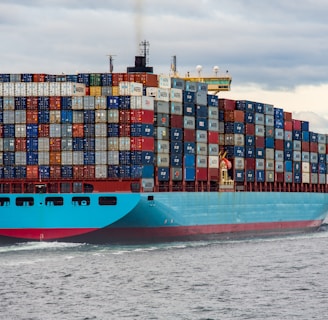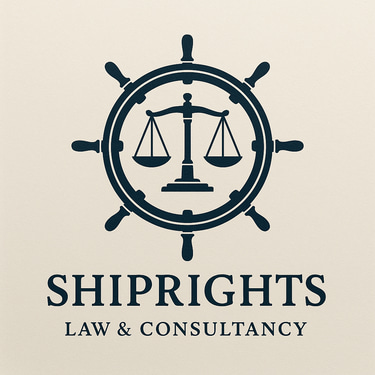Understanding Maritime Law: Key Insights for Shipowners and Operators
8/4/20255 min read


Essential Legal Considerations for
Shipowners and Operators
A Comprehensive Legal Overview by Shiprights Law & Consultancy
Introduction
Shipowners and operators form the backbone of international maritime trade, a domain that constitutes the primary mechanism for transporting goods across the globe. As international commerce becomes increasingly complex and regulated, the legal responsibilities of these actors grow in both scope and consequence. The obligations borne by shipowners and operators do not merely involve commercial success and operational efficiency, but extend to strict compliance with an intricate web of international conventions, national laws, and contractual frameworks.
This article aims to offer a detailed legal overview tailored to the interests and responsibilities of shipowners and operators. It addresses the principal legal concepts, obligations, and liabilities arising from ship ownership and management, as well as the contractual and regulatory architecture governing their activities. Furthermore, it highlights the legal remedies available to maritime stakeholders and concludes with expert legal guidance from a law firm exclusively dedicated to maritime law — Shiprights Law & Consultancy.
1. Legal Identity and Status of Shipowners and Operators
1.1. Shipowners
A shipowner is the legal or registered owner of a vessel, possessing full proprietary rights. Depending on the ownership structure, shipowners may act directly in vessel operations or delegate technical and commercial management to third parties. The shipowner is typically liable for ensuring that the vessel remains seaworthy, adequately crewed, properly equipped, and legally compliant throughout its operational lifecycle.
1.2. Ship Operators
A ship operator is often responsible for the commercial or technical management of a vessel on behalf of the owner. Operators may act as bareboat charterers, time charterers, or management companies tasked with ensuring compliance with port regulations, maintenance schedules, crewing requirements, and voyage planning. In certain jurisdictions, operators may be jointly liable with the owner for breaches of maritime obligations.
2. Primary Legal Obligations
2.1. Seaworthiness and Safety
Shipowners have a continuing duty to ensure that vessels are seaworthy. This obligation is recognized under common law and codified in instruments such as the Hague-Visby Rules and the ISM Code. The duty includes the adequacy of the vessel’s structure, machinery, safety equipment, and crew competence. Breach of this duty may result in substantial civil liability, particularly in the event of cargo loss or personal injury.
2.2. Pollution and Environmental Regulations
Environmental obligations are governed primarily by MARPOL and related IMO conventions. Owners and operators must ensure that vessels are compliant with international standards concerning oil discharges, ballast water management, sulfur emissions (IMO 2020), and garbage disposal. Violations may result in criminal penalties, vessel detention, or even blacklisting by port authorities.
2.3. Crew Welfare and Labour Compliance
The Maritime Labour Convention (MLC 2006) mandates shipowners and operators to guarantee fair working and living conditions, medical access, timely payment of wages, and repatriation rights. Port State Control inspections frequently target MLC compliance, and failure may lead to detention and legal action from seafarers or their unions.
2.4. Cargo Handling and Delivery Obligations
Shipowners and carriers bear strict obligations under international carriage regimes, such as the Hague-Visby Rules or the Hamburg Rules. These rules define the liability framework for loss, damage, or delay of goods. The burden of proof often shifts depending on the contractual terms and applicable jurisdiction.
3. Contractual Frameworks in Maritime Operations
3.1. Charterparties
Charterparties are foundational contracts between the shipowner and a charterer. The most common forms include time charters, voyage charters, and bareboat charters. These contracts define the allocation of operational and financial risks, covering issues such as hire payments, off-hire clauses, laytime, demurrage, bunker responsibility, and indemnities. Disputes arising from performance, delays, or off-hire incidents are typically resolved through arbitration.
3.2. Bills of Lading
A bill of lading serves three legal functions: a receipt for goods, a contract of carriage, and a document of title. Issued by the carrier, it governs the relationship between the shipper, consignee, and carrier. Disputes over cargo loss or misdelivery are adjudicated based on the specific bill of lading terms and the international regime incorporated.
3.3. Ship Management Agreements
Where vessel operations are outsourced, ship management agreements delineate the scope of responsibility between the owner and the manager. These include obligations related to technical management, crewing, procurement, and budgetary oversight. Liability in such agreements often hinges on gross negligence or willful misconduct.
4. Liabilities and Insurance Mechanisms
4.1. Civil and Vicarious Liability
Shipowners are generally held vicariously liable for the actions of their crew and operational failures. This includes liability for collisions (under the International Regulations for Preventing Collisions at Sea – COLREGs), oil spills, salvage obligations, and injury claims. Liability can be contractual, statutory, or tortious.
4.2. Limitation of Liability
Under the 1976 Convention on Limitation of Liability for Maritime Claims (LLMC), owners may limit liability for certain claims unless it is proven that the loss was caused by their personal act or omission committed with intent or gross negligence. Limitation funds are typically calculated based on vessel tonnage.
4.3. P&I Club Protection
Protection and Indemnity (P&I) Clubs offer third-party liability insurance to shipowners and operators. Coverage includes pollution damage, crew illness, cargo loss, collision liabilities, and fines. Shipowners must comply strictly with club rules and reporting duties to preserve coverage.
5. Dispute Resolution and Enforcement
5.1. Vessel Arrest
The arrest of a ship is one of the most effective interim legal remedies in maritime disputes. Under the International Convention on the Arrest of Ships (1999), vessels may be arrested to secure maritime claims such as unpaid charter hire, crew wages, or collision damage. It is a strategic tool widely used in litigation and arbitration proceedings.
5.2. Arbitration
Arbitration is the preferred dispute resolution mechanism in maritime law. Major arbitration centers include the London Maritime Arbitrators Association (LMAA), Singapore Chamber of Maritime Arbitration (SCMA), and New York’s SMA. Most charterparties and bills of lading include arbitration clauses.
5.3. Litigation
Maritime claims may also be brought before admiralty courts in jurisdictions that allow in rem actions. Admiralty procedures often provide fast-track remedies and enforcement options, such as ship sale or arrest.
5.4. Alternative Dispute Resolution (ADR)
In minor disputes or pre-litigation phases, mediation and other ADR mechanisms can serve as cost-effective alternatives, particularly in port disputes, salvage negotiations, and demurrage settlements.
6. Emerging Legal Challenges
Decarbonization Compliance – IMO’s strategy on GHG emissions requires shipowners to adopt low-sulfur fuel, energy efficiency indices (EEXI), and carbon intensity indicators (CII).
Digitalization & Cybersecurity – Compliance with IMO Resolution MSC.428(98) has become mandatory for shipowners to manage cyber risks onboard and ashore.
Sanctions Compliance – Increased regulatory scrutiny over sanctioned jurisdictions requires due diligence in trade routes, charterers, and cargo origin to
avoid reputational and legal risks.
Conclusion and Legal Guidance
The role of shipowners and operators is both commercially and legally intensive. Understanding the full range of legal responsibilities — from vessel operation and crewing to environmental protection and cargo handling — is essential for successful maritime ventures. Given the dynamic and international nature of maritime law, it is not only advisable but imperative to consult with a law firm that specializes exclusively in this field.
Shiprights Law & Consultancy, headquartered in Istanbul, is a boutique law firm dedicated solely to maritime law and admiralty practice. Our legal team offers expert counsel to shipowners, charterers, insurers, P&I Clubs, and other maritime stakeholders in all matters related to:
Vessel Arrest & Release
Charterparty Disputes
Cargo Claims
Marine Insurance
Salvage & Towage
Collisions & Pollution
Port State Compliance
Maritime Arbitration & Litigation
We combine in-depth industry knowledge with robust legal advocacy to safeguard our clients' interests both at sea and in court.
🔹 Shiprights Law & Consultancy
🌐 www.shiprights.com
📍 Istanbul, Turkey
"Navigating maritime law — with clarity, strategy, and expertise."
